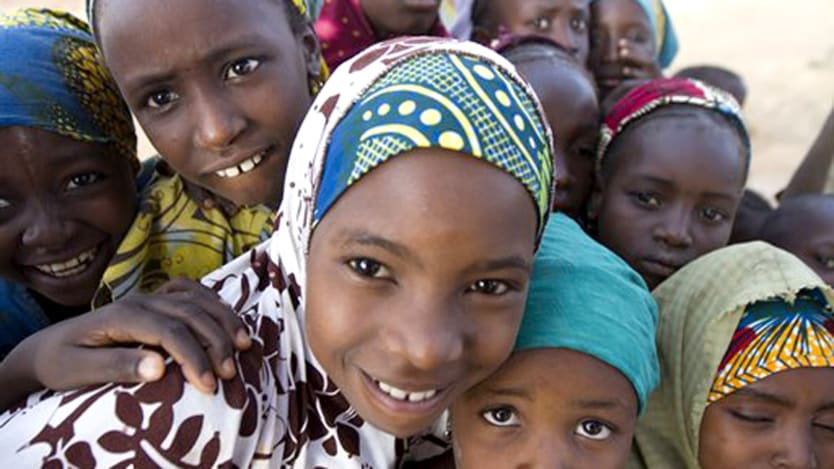
Improved data makes inequalities visible. Take for example the lives of two Nigerian girls — Fara and Abimbola — who were born one month apart.
Fara was born into a poor rural family of Hausa ethnicity in the country’s North West zone. Her 18-year-old mother did not receive any care prior to delivering Fara at home without a skilled health care worker. By comparison, Abimbola was born into a wealthy urban family in a city in Nigeria’s South zone. Abimbola’s 27-year-old mother had 10 antenatal care visits and delivered in a government-run health center with a skilled midwife. Abimbola weighed 3.5 kilograms (over 7.5 pounds) at birth. In 2013 by age 2, the girls’ health outcomes were substantially different. Fara’s growth was severely stunted and she was below the first percentile of the World Health Organization’s growth standards. Abimbola, however, was within the 30th percentile for height — well within the normal global range.
While their names are fictitious, the data is real and their life experiences show how unequal access to services and opportunities perpetuate poor health and nutrition outcomes, limiting the potential to lead a full life. This month the United Nations celebrates the 65th anniversary of the formal establishment of Human Rights Day observed globally each December. We support a focus on measuring and improving equity for the world’s poorest and most vulnerable to achieve the new Sustainable Development Goals while advancing social justice and human rights.
The study of inequalities was nearly absent from the scientific literature on global maternal, newborn and child health and nutrition until the early 2000’s. This began to change in 2001 when analyses of socio-economic inequalities within low- and middle-income countries were made possible by the incorporation of household asset indices in Demographic and Health Surveys as highlighted in the World Bank’s publication of such analyses.

In 2003, the Lancet Child Survival Series boldly stated that “more of the same is not enough” in a plea for the incorporation of an equity dimension in monitoring, accountability, country-level programming and advocacy. The Lancet series helped launch the Countdown to 2015 initiative in 2005, which has since issued seven global reports where equity analyses play a major role. Several countries, such as Brazil, Mexico, Bangladesh and Peru started to employ explicit equity criteria to guide program implementation. UNICEF embarked on its own journey of prioritizing equity in child survival, health and nutrition. Today at a global level, the Health Equity Monitor at the World Health Organization keeps track of maternal and child health inequalities based on analyses carried out at the Federal University of Pelotas in Brazil.
While the Millennium Development Goals failed to include equity, the SDGs have placed this guiding principle squarely within our global remit, acknowledging that equity is central to sustainable global progress.
Equity is a critical component of SDG 3 — ensure healthy lives and promote well-being for all at all ages; SDG 5 — achieve gender equality and empower all women and girls; SDG 10 — reduce inequality within and among countries; and SDG 17.18, which calls for countries to increase the availability of data disaggregated by income, gender, age, race, ethnicity, migratory status, disability, geographic location and other characteristics relevant in national contexts by 2020. The global community realizes that measuring equity matters.
The Lancet recently published a comment authored by more than 20 global maternal, newborn, and child health experts, who identified equity as one of five key principles to improve measurement and data use, along with focus, relevance, innovation and leadership.
If we want to ensure a more equitable future for children like Fara, we need to focus on three key dimensions of measuring equity: monitoring, evaluation and action.
First, we must continue to monitor equity. Fortunately, the global community has developed effective processes for how to measure equity through initiatives such as Countdown to 2015 and the WHO Health Equity Monitor where we can see whether coverage of health interventions are becoming more or less equitable across wealth quintiles, gender, and residence over time. Still, more can be done to monitor equity among ethnic groups, the urban poor, and wealth deciles.
Second, the evaluation dimension of equity also requires better evidence and understanding. Program evaluations must produce disaggregated results to ensure that the neediest are being reached. We also need to ask ourselves what we are not measuring well enough today, such as women’s empowerment, in preparation for tomorrow.
Third, we need action. We know enough about measuring equity today to identify the “Faras” of the world who are experiencing these inequities and prioritize programs and resources to more effectively reach them.
Equity provides a platform for focusing on those who are being left behind. With the SDGs, we have a new global mandate before us. We need to carry forward the momentum we have built to tackle the measurement and programming challenges ahead. We need to invest in improving indicators, data sources, and communication tools to best measure equity and progress. In sum, a focus on equity is a powerful step toward better health, development, social justice and human rights.
To read additional content on global health, go to Focus On: Global Health in partnership with Johnson & Johnson.

